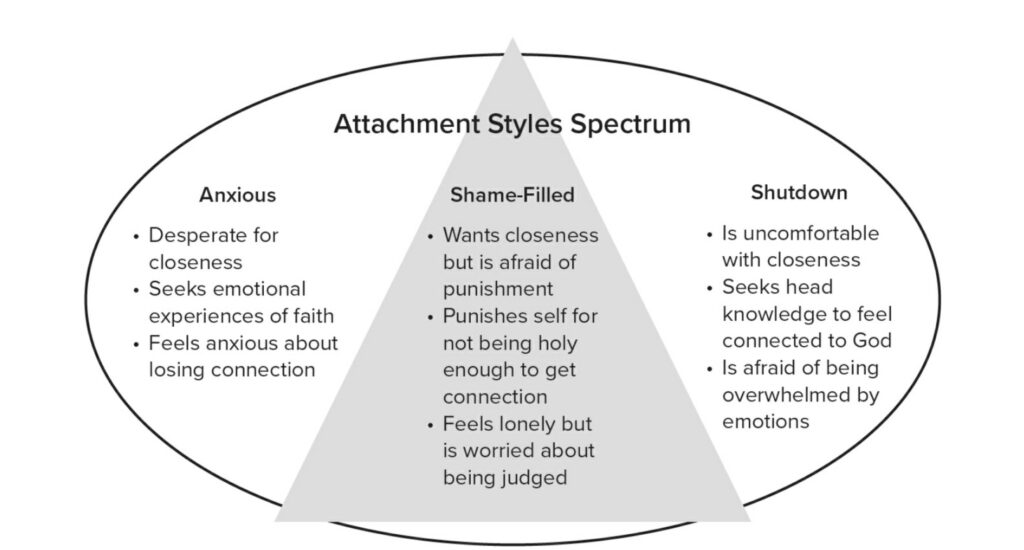Christianity and attachment style play a crucial role in shaping personal relationships, faith, and emotional well-being. Attachment theory, developed by psychologist John Bowlby, explains how early childhood experiences influence the way individuals connect with others. Christianity, as a faith centered on love, trust, and divine relationships, provides insights into how different attachment styles impact spiritual growth and interpersonal bonds.
The connection between Christianity and attachment style, we analyze how secure, anxious, avoidant, and disorganized attachment influence a believer’s relationship with God, as well as their interactions with family and the church community.
Understanding Attachment Styles
Attachment theory categorizes human bonding into four primary styles:
- Secure Attachment – Individuals with this style feel comfortable with intimacy and trust. They are confident in relationships and have a positive self-image.
- Anxious Attachment – People with anxious attachment crave closeness but often fear abandonment, leading to emotional ups and downs.
- Avoidant Attachment – Those with this style value independence and struggle with emotional intimacy, often distancing themselves from deep connections.
- Disorganized Attachment – This style results from traumatic experiences, leading to conflicting behaviors in relationships, where individuals desire closeness but also fear it.
Christianity and attachment styles intersect in profound ways, ultimately influencing how believers relate to God, shape their interpretation of scripture, and navigate interactions within the church.
Secure Attachment and Christianity
A secure attachment style aligns well with Christianity’s teachings of love, trust, and faith. People with this attachment type often experience:
- A strong relationship with God – They view God as a loving Father who provides security and unconditional love.
- Healthy church involvement – Securely attached believers form meaningful relationships within their Christian community.
- Resilience in faith – They rely on their faith during challenges, trusting God’s plan without overwhelming anxiety.
the Bible encourages secure attachment through verses like Romans 8:38-39, which assures believers that nothing can separate them from God’s love.
Anxious by Attachment
Individuals with an anxious attachment style may struggle with insecurity in their faith, often fearing rejection from God or their spiritual community. Common characteristics include:
- Seeking constant reassurance – They may feel the need to repeatedly confirm God’s love and acceptance.
- Fear of spiritual failure – Anxiously attached believers worry about not being “good enough” in their faith.
- Over-dependence on religious leaders – They may place excessive trust in pastors or mentors for guidance.
Christianity, therefore, offers reassurance for those with anxious attachment. For instance, Philippians 4:6-7 encourages believers to trust God rather than worry. Moreover, engaging in prayer, meditation, and scripture reading can help anxious Christians develop a stronger, more secure faith.
Avoidant Attachment Christianity
People with an avoidant attachment style struggle with emotional closeness, even in their faith. Characteristics include:
- Difficulty trusting God fully – They may resist surrendering their lives completely to God.
- Independence over reliance on faith – Avoidantly attached individuals often prioritize self-sufficiency over seeking divine guidance.
- Limited church engagement – They may avoid deep relationships within the Christian community.
However, Christianity teaches the importance of connection and trust. Verses like Proverbs 3:5-6 emphasize relying on God rather than leaning solely on one’s understanding. Building a consistent prayer life and engaging in fellowship can help avoidant individuals develop a deeper relationship with God and others.
Disorganized the Attachment
Disorganized attachment stems from fear and trauma, creating confusion in relationships and faith. Characteristics include:
- Conflicted view of God – Individuals may see God as both loving and punishing.
- Emotional instability in faith – They may oscillate between deep devotion and doubt.
- Fear of abandonment by God – Past traumas may lead them to question God’s presence.
Healing through Christianity is indeed possible. For instance, Psalm 147:3 reminds believers that God heals the brokenhearted. Moreover, Christian counseling, support groups, and scripture-based meditation can all work together to help those with disorganized attachment find stability in their faith.
How Christianity Can Help Heal Attachment Wounds
Christianity provides a pathway to healing for those struggling with insecure attachment styles. Key ways include:
- Understanding God’s unconditional love – Recognizing that God’s love is unwavering helps combat fears of rejection.
- Developing a personal relationship with Christ – Prayer, worship, and scripture reading foster a secure spiritual bond.
- Engaging in Christian community – Church fellowship provides support, encouragement, and meaningful connections.
- Seeking Christian counseling – Faith-based therapy can help individuals work through attachment wounds.
Conclusion about Christianity and attachment style
Christianity and attachment style are deeply interconnected, as they both influence how individuals relate to God and others. For instance, securely attached believers naturally embrace faith with ease. On the other hand, those with anxious, avoidant, or disorganized attachment may face spiritual struggles. Nevertheless, through God’s love, Christian teachings, and the support of a faith community, healing and transformation are not only possible but also attainable.
By understanding attachment styles and their impact on faith, believers can strengthen their spiritual journey, develop healthier relationships, and grow in their connection with Christ.Whether struggling with insecurity or striving for independence, Christianity not only provides hope but also offers guidance and a strong foundation for both emotional and spiritual security.




Hey There. I found your blog using msn. This is an extremely well written article.
I’ll be sure to bookmark it and return to read more of your useful info.
Thanks for the post. I’ll certainly comeback.
Hi there Dear, are you truly visiting this website on a
regular basis, if so afterward you will without doubt take nice know-how.
Great delivery. Great arguments. Keep up the good spirit.
I’ll immediately grab your rss feed as I can not to find your email subscription link or newsletter service.
Do you have any? Please allow me understand so that I may just subscribe.
Thanks.
No matter if some one searches for his vital thing, so he/she wants to be available that in detail, so that thing is maintained over here.